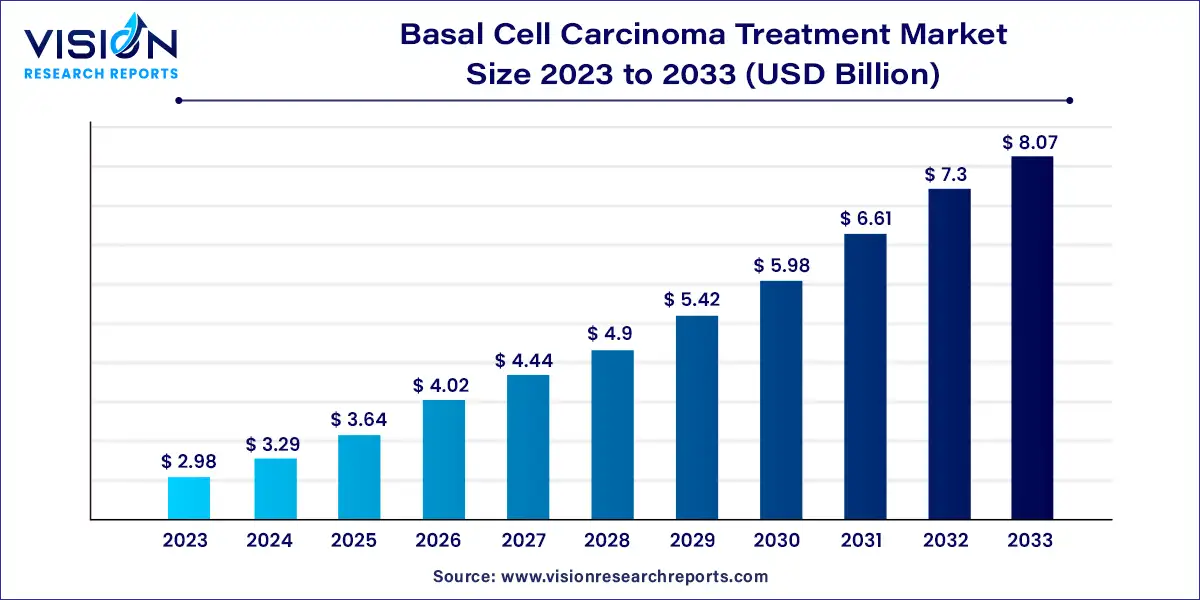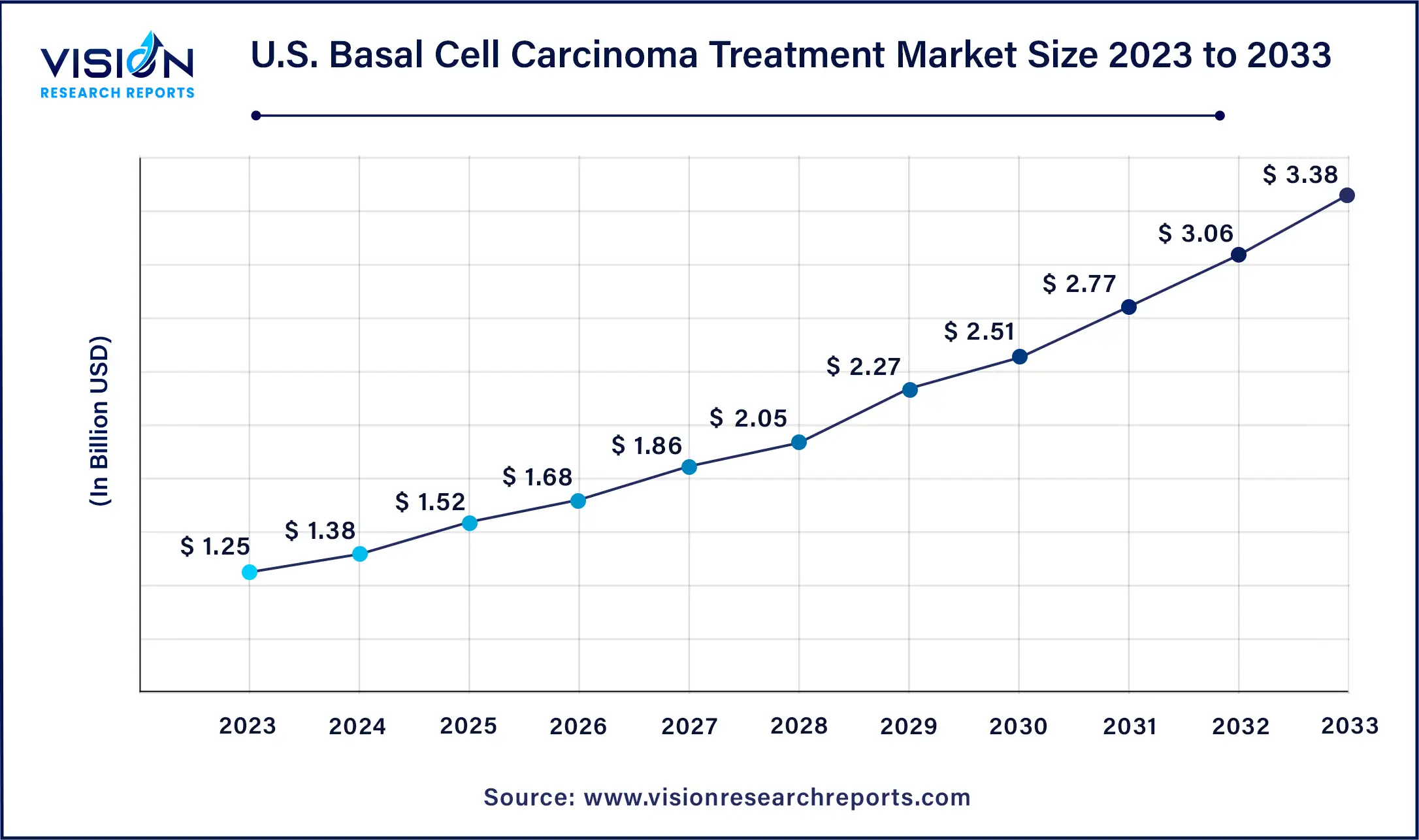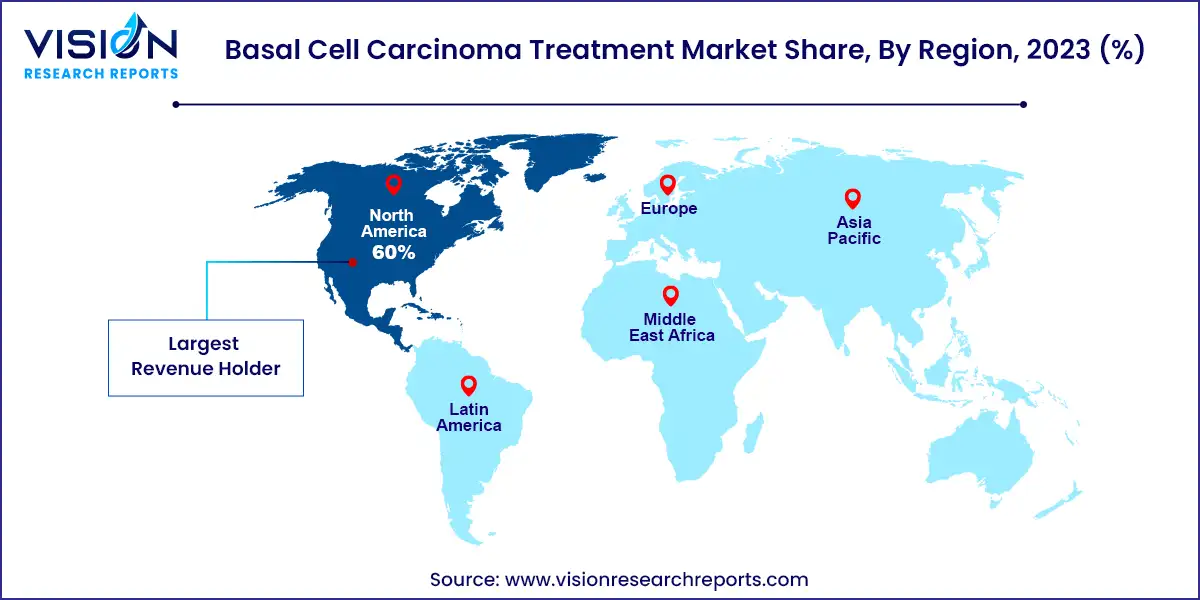The global basal cell carcinoma treatment market size was estimated at around USD 2.98 billion in 2023 and it is projected to hit around USD 8.07 billion by 2033, growing at a CAGR of 10.47% from 2024 to 2033.

The basal cell carcinoma (BCC) Treatment Market offers various effective therapies for managing this prevalent skin cancer, primarily caused by sun exposure. Surgical excision, Mohs surgery, radiation, topicals, and new targeted therapies drive the market. North America leads due to high incidence and advanced healthcare, while Asia Pacific shows growth with improved access and awareness. Innovation and research investments continue to enhance treatment outcomes globally.
The growth of the basal cell carcinoma (BCC) treatment market is driven by an increase in the incidence of BCC globally, contributing to greater demand for effective treatment options. Technological advancements in surgical techniques such as Mohs surgery and the development of targeted therapies have expanded treatment possibilities, improving outcomes for patients. Rising awareness about skin cancer, coupled with proactive screening initiatives, has led to earlier detection and treatment, further boosting market growth. Additionally, robust investments in research and development by pharmaceutical companies to innovate new therapies and improve existing treatments are fostering market expansion.
The U.S. basal cell carcinoma treatment market size was estimated at around USD 1.25 billion in 2023 and it is projected to hit around USD 3.38 billion by 2033, growing at a CAGR of 10.45% from 2024 to 2033.

In the U.S., which dominated the North American market in 2023, increasing cases of basal cell carcinoma are expected to sustain market growth. Basal cell carcinoma constitutes approximately 80% of all non-melanoma skin cancer cases in the U.S., with rising incidences driving demand for treatment options.
North America accounted for 60% of the basal cell carcinoma treatment market revenue in 2023. The region's growth is driven by the rising prevalence of BCC, advancements in treatment technologies, heightened awareness of skin cancer risks, and increased emphasis on early detection and preventive care. In 2022, North America reported 531,423 cases of Nonmelanoma Skin Cancer (NMSC), with UV radiation exposure from sunlight and artificial sources contributing to BCC prevalence.

The Asia Pacific market is poised for the fastest growth from 2024 to 2033, driven by factors including heightened disease awareness, improved diagnostic capabilities, and increasing incidence of skin cancers due to aging populations and changing environmental conditions. Although the incidence of NMSC in East and Southeast Asia is lower compared to North America and Europe, rising awareness and diagnostic improvements are anticipated to drive market expansion.
The surgery segment led the market, capturing a 36% revenue share in 2023. This dominance stems from advancements in surgical techniques, the emergence of minimally invasive procedures, and heightened awareness of skin cancer, which promotes early diagnosis and treatment. Surgeries are preferred by patients due to their high success rates and proven efficacy, driving demand for effective surgical interventions. In the U.S., approximately 850,000 Mohs surgeries are performed annually, underscoring the significant volume supporting market growth. The increasing preference for surgical treatments for basal cell carcinoma is expected to continue driving market expansion.
The intralesional injections segment is projected to achieve the fastest compound annual growth rate (CAGR) from 2024 to 2033. These injections have become a pivotal treatment option for BCC patients seeking nonsurgical alternatives. Offering targeted therapy with potentially fewer systemic side effects, intralesional injections deliver therapeutic agents directly into tumors. Commonly used drugs include bleomycin, fluorouracil, methotrexate, chloroquine, rituximab, and interferons. The development and commercialization of novel intralesional injections are poised to further bolster market growth in the forecast period.
By Treatment Type
By Region
 Cross-segment Market Size and Analysis for
Mentioned Segments
Cross-segment Market Size and Analysis for
Mentioned Segments
 Additional Company Profiles (Upto 5 With No Cost)
Additional Company Profiles (Upto 5 With No Cost)
 Additional Countries (Apart From Mentioned Countries)
Additional Countries (Apart From Mentioned Countries)
 Country/Region-specific Report
Country/Region-specific Report
 Go To Market Strategy
Go To Market Strategy
 Region Specific Market Dynamics
Region Specific Market Dynamics Region Level Market Share
Region Level Market Share Import Export Analysis
Import Export Analysis Production Analysis
Production Analysis Others
Others